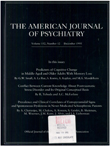Development of aphasia, apraxia, and agnosia and decline in Alzheimer's disease
Abstract
OBJECTIVE: The purpose of this study was to compare the stage and the subtype models of disease progression in Alzheimer's disease. The authors address the issue of whether the overall rate of clinical decline is different in Alzheimer's disease patients with and without early development of aphasia, apraxia, or agnosia. METHOD: The study was a case series study. Two separate cohorts of Alzheimer's disease patients were used, one from an ongoing single center study at Stanford University (N = 57) and the other from a multicenter project across the state of California (N = 70). Patients were assessed every 6 months in the Stanford study and yearly in the state study. All patients were assessed at least three times. The outcome measure was the average rate of decline on the Mini-Mental State examination. RESULTS: The average rates of decline on the Mini-Mental State were computed for each subject. Subjects were then divided among groups according to whether and when they exhibited aphasia, agnosia, or apraxia. The effects of the presence of aphasia, agnosia, or apraxia were assessed by comparing the average rates of decline on the Mini-Mental State. CONCLUSIONS: Alzheimer's disease patients who developed aphasia or apraxia declined more rapidly than those patients who did not develop either sign. These results were not attributable to differences in Mini-Mental State scores at entry into the study. The results suggest the presence of subtypes of Alzheimer's disease in which accelerated decline is associated with the early appearance of certain neurological signs.
Access content
To read the fulltext, please use one of the options below to sign in or purchase access.- Personal login
- Institutional Login
- Sign in via OpenAthens
- Register for access
-
Please login/register if you wish to pair your device and check access availability.
Not a subscriber?
PsychiatryOnline subscription options offer access to the DSM-5 library, books, journals, CME, and patient resources. This all-in-one virtual library provides psychiatrists and mental health professionals with key resources for diagnosis, treatment, research, and professional development.
Need more help? PsychiatryOnline Customer Service may be reached by emailing [email protected] or by calling 800-368-5777 (in the U.S.) or 703-907-7322 (outside the U.S.).



